College of Science Faculty Named Finalists for Prestigious Teaching Awards
The UNC Charlotte Award for Teaching Excellence honors outstanding non-tenure track teachers on our campus and provides an example of the University’s commitment to excellence in teaching.
This year, two College of Science faculty have been named as finalists for the award and one was recognized with an honorable mention. The winner of the award will be announced at a ceremony on Sept. 5.
Bernadette Donovan-Merkert, dean of the College of Science, said “I am excited to have our College of Science faculty recognized for their outstanding teaching abilities. Our faculty take great care to make their course content meaningful while building students’ confidence to learn difficult subjects and inspiring them to be scientifically inquisitive.”
Susan Michael, senior lecturer, chemistry
Michael is an exceptional teacher who has touched the lives of her students through her desire to get to know each of them individually. She is universally recognized as an excellent teacher by her students and peers.
“As a teacher, I believe it is my responsibility to do four basic things for all of my students,” said Michael. “I must motivate my students to want to learn; I must present the material in a manner that makes it easy for students to learn effectively; I must provide meaningful opportunities for students to use or practice their newly acquired knowledge; and I must assess their learning in a fair and appropriate manner.”
John Taylor, teaching professor, mathematics and statistics
Taylor is a distinguished educator known for his innovative and student-centered approach to teaching mathematics. His teaching philosophy is rooted in motivating students and fostering self-confidence. Taylor’s commitment to education is evident in his development of comprehensive guided notebooks and a library of course videos, which have become invaluable student resources.
“I believe that each student has a unique learning style and that each class requires its own approach,” said Taylor. “I feel it is important to motivate and encourage students and ensure that they maintain a high level of self-confidence. My mission as a teacher is to consider all variables and provide an environment and method that is as effective as possible.”
Andrew Goff, lecturer of biological sciences, was also recognized with an honorable mention.
Matt Parrow Alleviates Neighborhood Concerns Over ‘Blood’ Red Pond
When a subdivision in Union County grew increasingly concerned over a bright red storm water pond, a news station turned to the UNC Charlotte College of Science to get expert answers.
Residents reported the Indian Trail neighborhood’s homeowners association was unresponsive over their concerns that the pond could contain a toxic red algae bloom. With a lack of answers, the neighbors turned to WBTV and provided Channel 3 news with a sample from the pond.
“It looks just like blood,” said the concerned resident in the television interview. WBTV brought a sample of the pond water for investigation to Matthew Parrow, Ph.D., professor of Biological Sciences and associate dean for academic administration.
Parrow was able to examine the water sample under microscopy to determine the source of the red color in the pond.
“This isn’t a algal bloom at all, but actually a plant bloom. Growing on the surface of that pond is a high abundance of water meal and duckweed,” said Parrow. He further explained that they likely proliferated from recent rains, when fertilizer might wash into the slow-moving body of water and give the plants extra food to grow. The red color is an adaptation that protects the plants from sunlight.
The best news that WBTV could take back to the concerned residents is that Parrow assures them the plants are natural and non-toxic for the environment and humans.

Watch the full report from WBTV and Matthew Parrow, Ph.D. testing the pond water.
Bernadette Donovan-Merkert named founding dean of the College of Science
Bernadette Donovan-Merkert has been named as the founding dean of the College of Science after serving in the role for more than a year as interim. Her appointment, approved by the UNC Charlotte Board of Trustees, is effective Aug. 15.
“Bernadette has spent her career at Charlotte supporting our students, leading faculty, promoting innovative research and nurturing the growth of our programs in the STEM fields,” said Jennifer Troyer, provost and vice chancellor for academic affairs. “She is strategically developing the College of Science to align our teaching, community outreach and exemplary research, which is building a talent pipeline serving the Charlotte region and beyond.”
Prior to serving as interim dean, Donovan-Merkert led the Department of Chemistry as chair for more than 18 years. As chair she was integral in the design and development of the Nanoscale Science Ph.D. program and also served as the program director.
“I am thrilled to continue this important work building the College of Science with the collaboration of great leaders and our dynamic faculty,” said Donovan-Merkert. “Science is at the heart of developing an inquisitive, scientifically literate society. We are well positioned as an incubator of innovative teaching and cutting-edge research to support our students, drive discovery and advance partnerships through our community.”
10,000th Rehabilitated Raptor Released on Campus
The College of Science hosted the Carolina Raptor Center as they released their 10,000th rehabilitated raptor on Saturday, Aug. 10. The red-tailed hawk spent 58 days in CRC’s hospital facility and was released into the trees at the Hauser Alumni Pavilion in front of a crowd of guests, including families and CRC volunteers. The event was held on campus where the center was “hatched” 49 years ago, in what is now the Department of Biological Sciences.
CRC’s story began at UNC Charlotte in 1975 when an injured broad-winged hawk was brought to ornithologist Richard Brown, Ph.D., which sparked the idea for a raptor rehabilitation center. In 1981, Brown and student Deb Sue Griffin co-founded the center as a nonprofit organization. In 1984, the nonprofit was in need of more space and moved the center from campus to its current location within the Latta Nature Preserve. The raptor hospital has since evolved into a sophisticated facility capable of providing specialized treatment tailored to the unique needs of these birds and CRC has grown into a leading institution dedicated to the rehabilitation, education, and conservation of birds of prey.
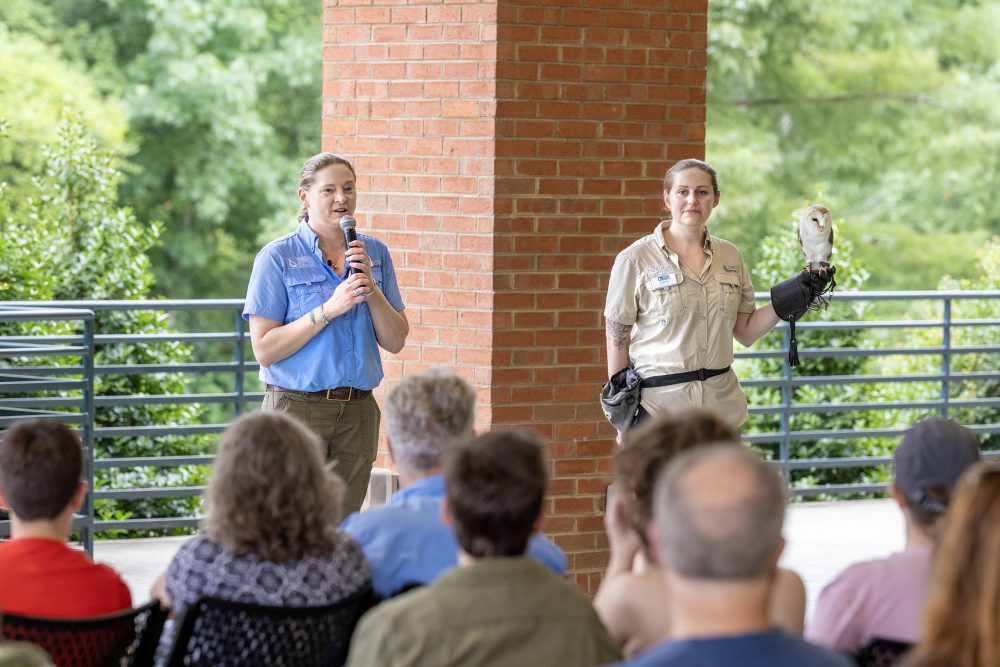
Bernadette Donovan-Merket, interim dean of the College of Science, remarked to the attendees that this event allowed campus to start residential move-in a little early. “We are so excited to welcome this red-tailed hawk to the beautiful and ecologically diverse habitat of the UNC Charlotte campus. The trees are a little different from the dorms, but our campus can certainly take another resident,” said Donovan-Merkert. “We have already told the squirrels to be on the lookout for our newest Niner.”
Katherine Hall-Hertell, associate dean of graduate academic and student affairs, serves as a board member of the organization. “I joined the Board of the Carolina Raptor Center because I am inspired by their mission and vision. When I learned that CRC began at UNC Charlotte, I felt an even stronger commitment and I’m honored to be a bridge between the two organizations,” said Hall-Hertell. “I am so glad we could participate in this impressive achievement. It feels like we are closing a circle releasing this raptor patient at Charlotte.”
“We are incredibly proud to celebrate this milestone at UNC Charlotte, where our journey began,” said Erin Katzner, President and CEO of the Carolina Raptor Center. “Releasing our 10,000th rehabilitated raptor, a hawk, at the place of our inception is a profound moment for all of us. It represents the dedication and hard work of our staff, volunteers, and supporters over the years.”
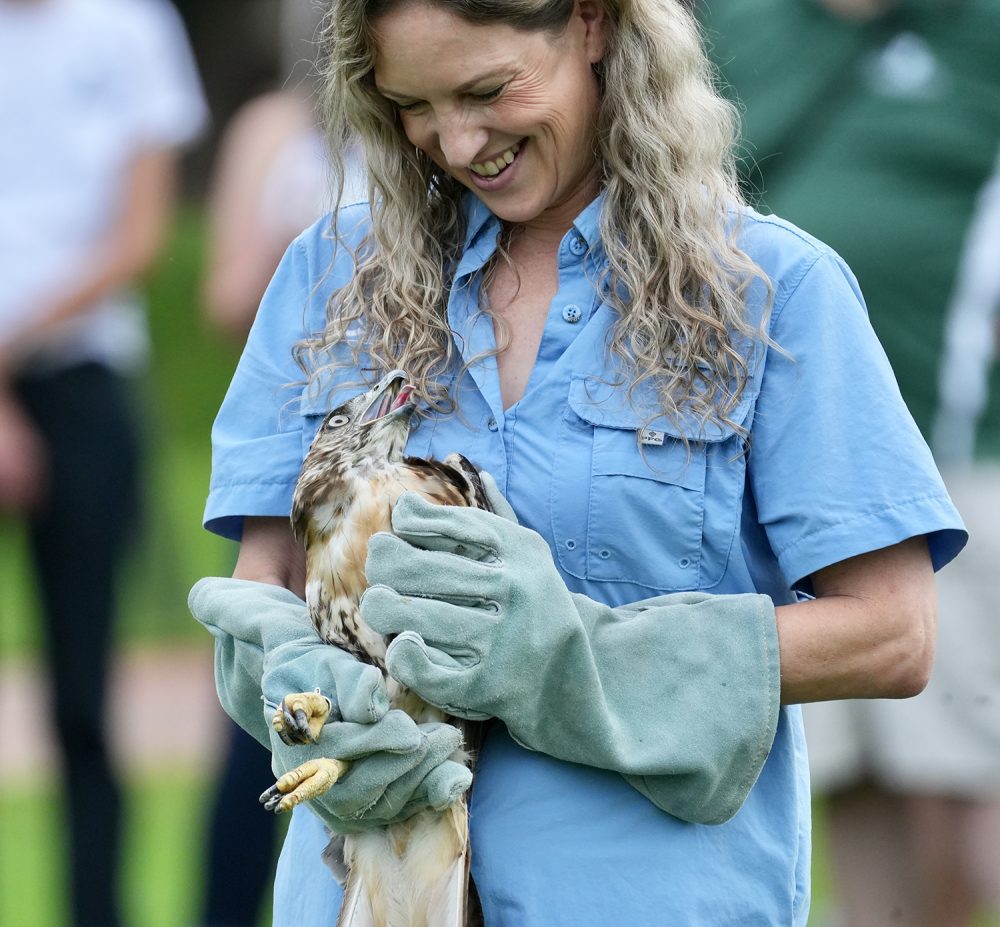
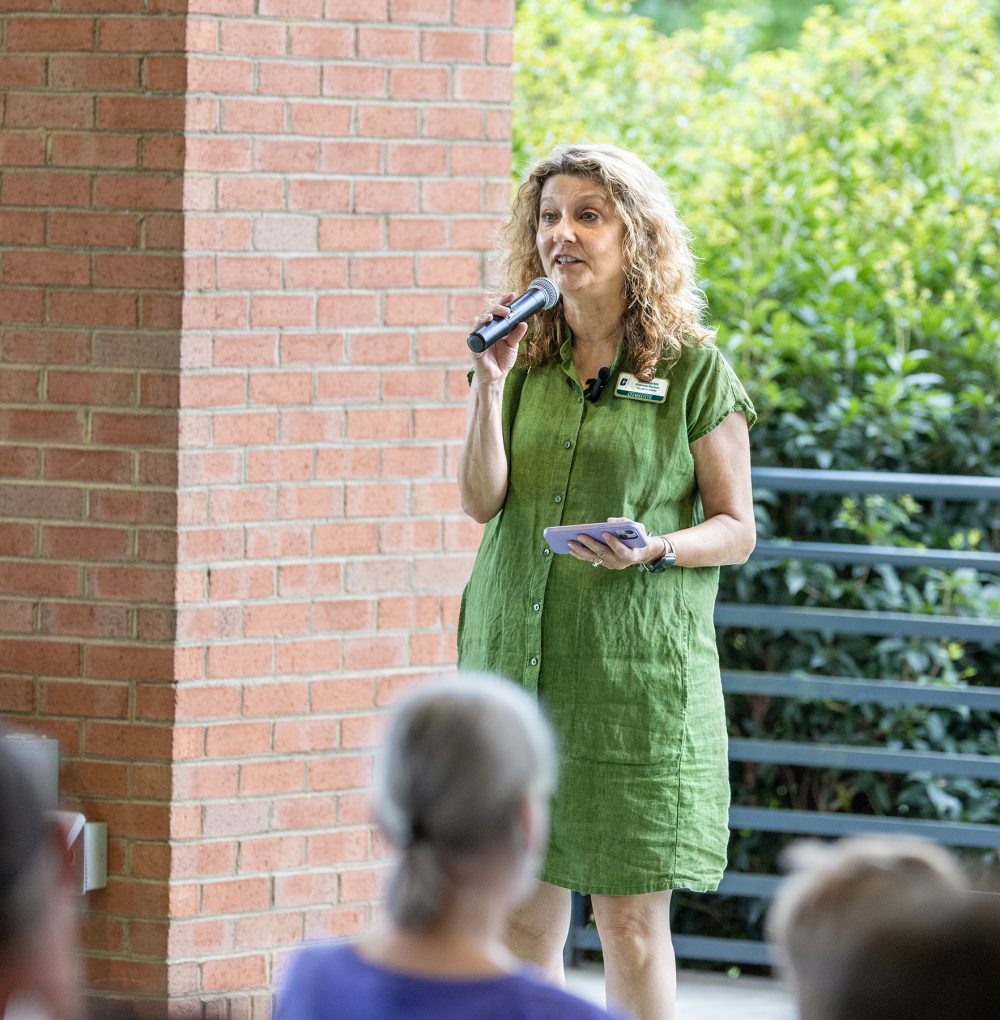
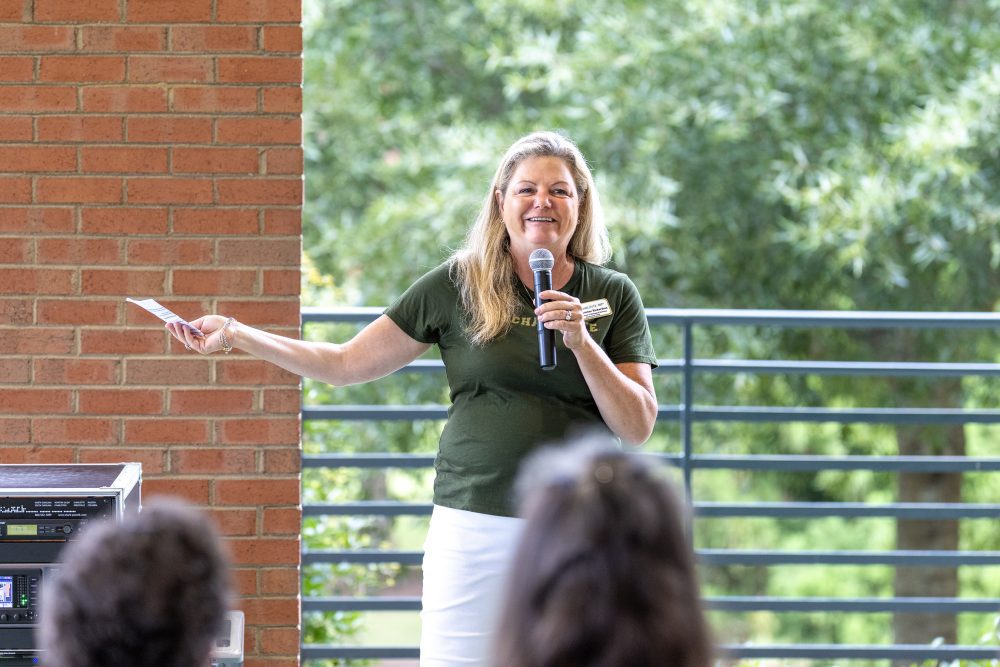
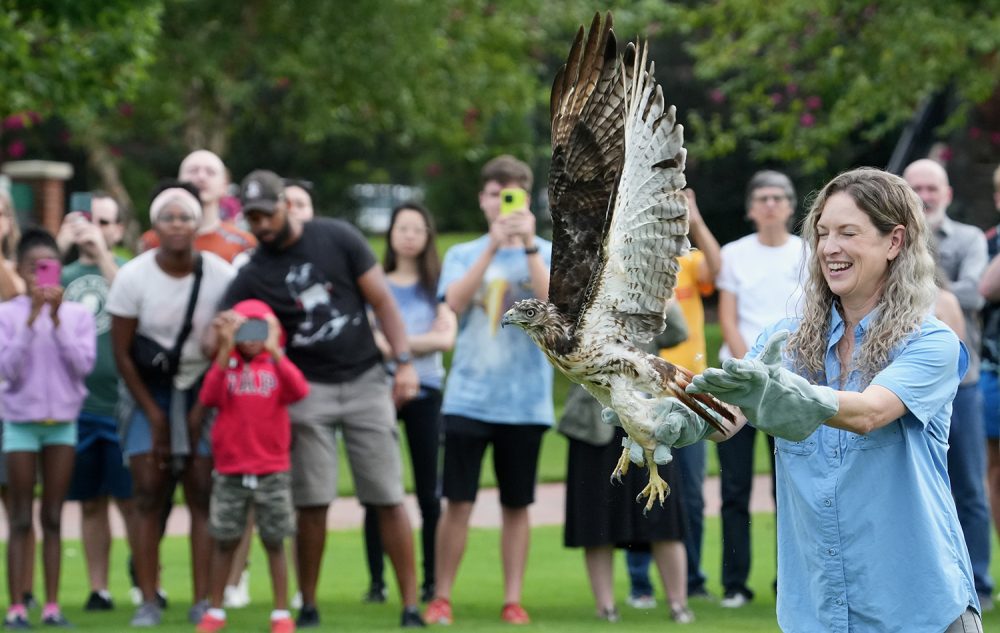
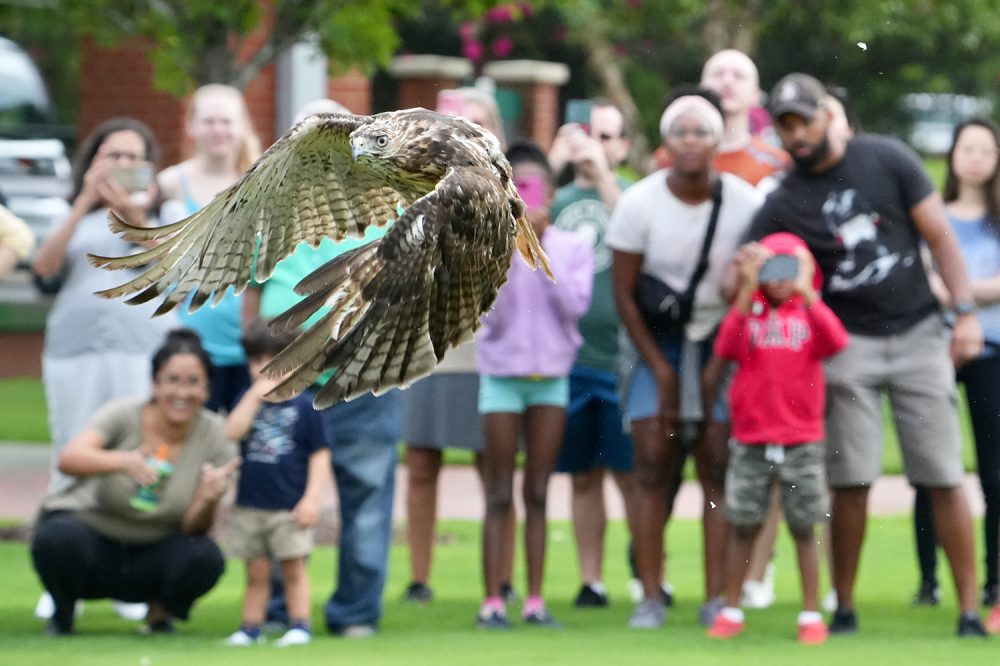
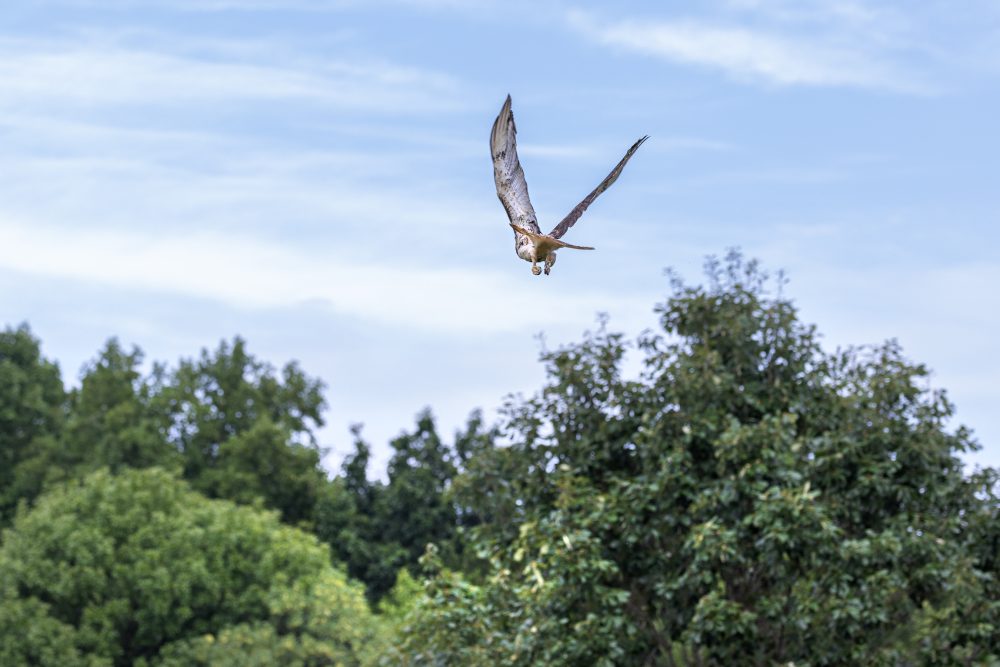
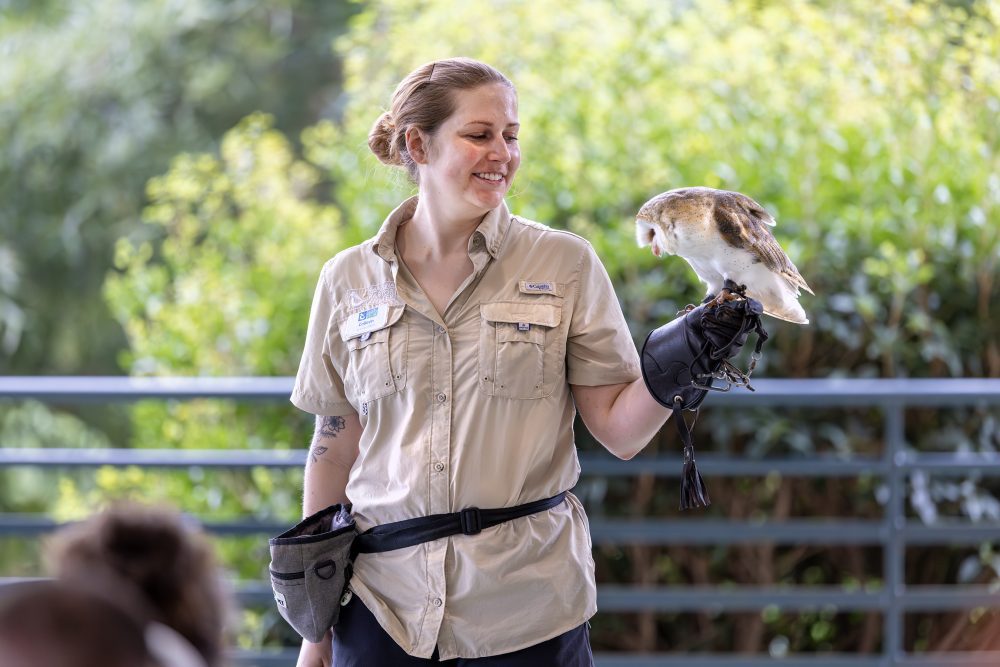
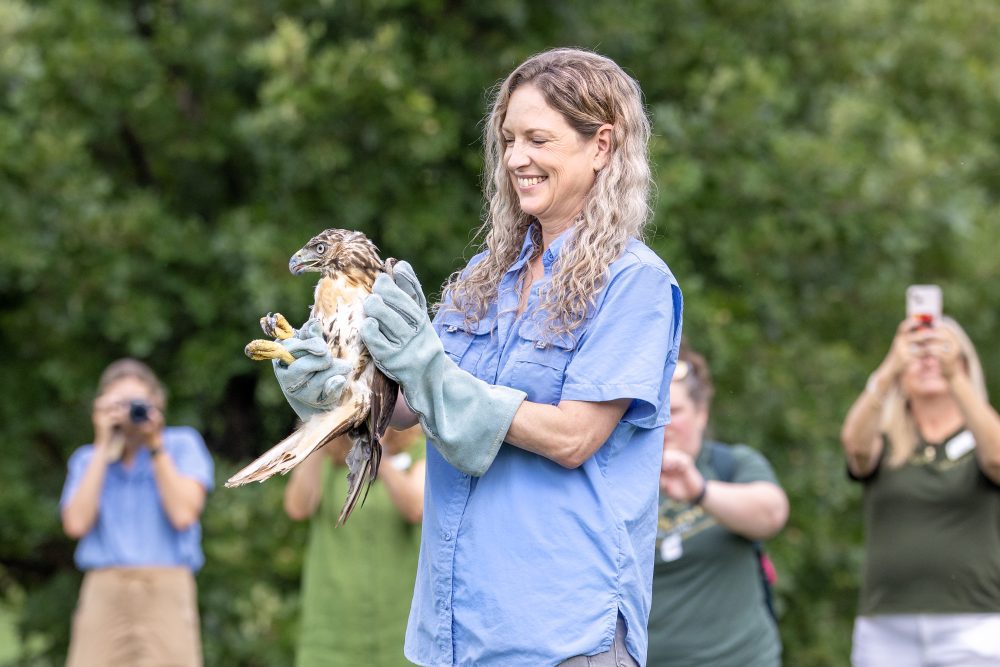
Double Major Dhairya Desai Awarded Newman Civic Fellowship
Dhairya Desai, a rising senior and chemistry honors student, has been named a 2024-25 Newman Civic Fellow.
The fellowship is awarded by Campus Compact, a national non-profit and the oldest association in higher education dedicated to civic and community engagement.
Desai is a Levine Scholar working towards a Bachelor of Science in Chemistry and a Bachelor of Science in Biology, with a concentration in biochemistry. As part of the Levine Scholars program, Desai has engaged in community service with Habitat for Humanity and has served as an impact intern with Atrium Health. Desai is planning for a career in medicine.
Read more about Desai’s fellowship.
Jordan Poler Awarded NCInnovation Grant
Jordan Poler, professor of chemistry, has been awarded a grant through a pilot program from NCInnovation. He is one of two UNC Charlotte faculty selected for the funding and among eight researchers chosen from the UNC System.
The grant will allow Poler to expand on his team’s recent innovations in water purification that have led to the creation of patented materials capable of removing harmful compounds more effectively than current market solutions.
At UNC Charlotte, Poler leads a research group that includes students from various disciplines focused on the development of advanced materials.
Poler founded startup naneXPure LLC and will work with Goulston Technologies, based in Monroe, to scale up the drinking water purification materials from bench to industry scale. Poler’s research on water purification materials, which includes the synthesis of polyelectrolytes, novel coordination complexes and nanostructured materials, shows the potential of nanoscale science to create impactful, real-world solutions to improve public health, he said.
Poler, a Fulbright scholar, has previously received grants from the Environmental Protection Agency, the National Science Foundation and the Department of Defense for his research on water purification.
Read more about the grants awarded to UNC Charlotte researchers.
Two College of Science Professors Receive Prestigious University Awards
The UNC Charlotte Faculty Awards Ceremony was held on Monday, May 13 and two College of Science professors were recognized with some of the University’s most prestigious awards.
Adam Reitzel, professor of biological sciences, was awarded the First Citizens Bank Scholars Medal, which recognizes research excellence.
Reitzel serves as the graduate program director for the Department of Biological Sciences and co-director of the Center for Computational Intelligence to Predict Health and Environmental Risks, CIPHER.
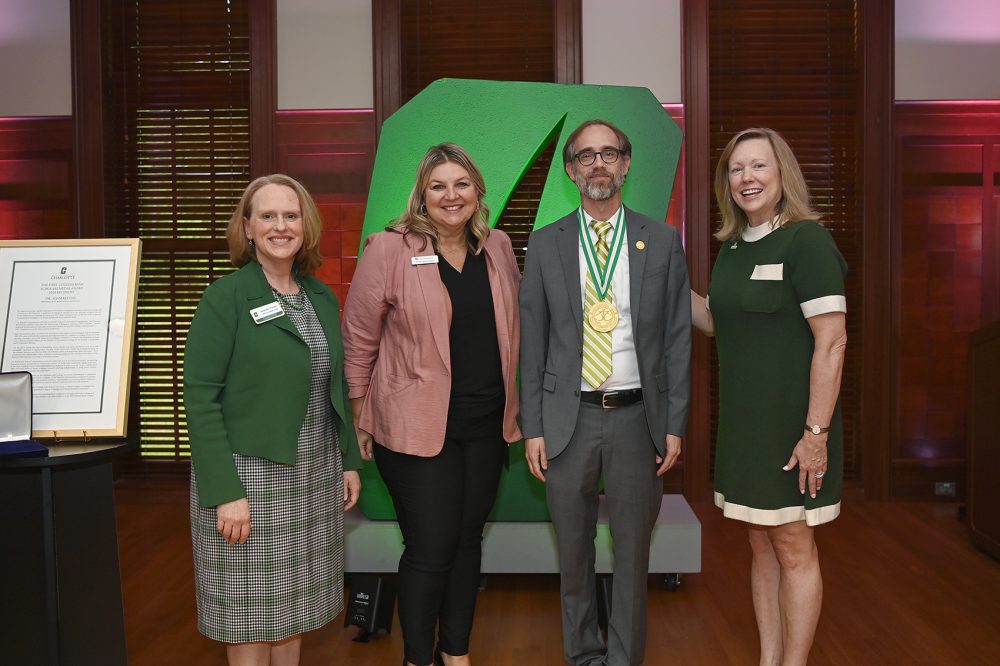
“Adam Reitzel offers a model for leadership and research, involving students at every level of his work. He marks the ninth winner of the First Citizens Bank Scholars Medal from the College of Science since the award’s inception, which is an outstanding accomplishment. I am so proud of the leadership our faculty provide, not just within our College, but across UNC Charlotte,” said Bernadette Donovan-Merkert, interim dean of the College of Science.
Juan Vivero-Escoto, professor of chemistry, was awarded the Harshini V. de Silva Graduate Mentor Award, which recognizes mentorship of graduate-level students.
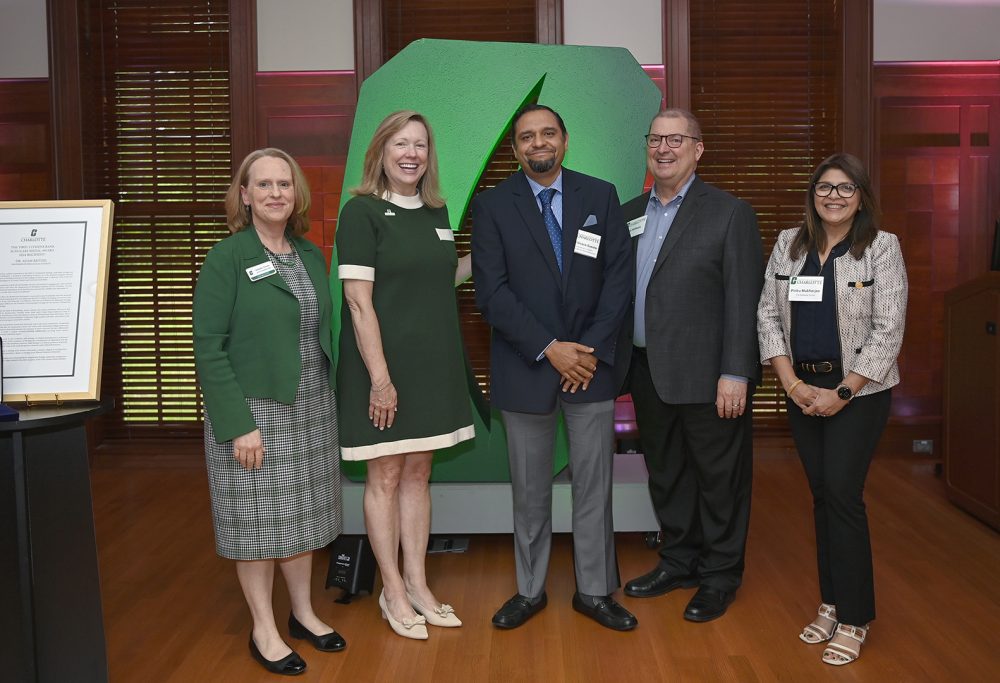
Vivero-Escoto serves as director of the UNC Charlotte Center for Innovation, Translational Research and Applications of Nanostructured Systems, CITRANS.
“Juan Vivero-Escoto offers ceaseless support and mentorship of our students, setting high but individualized expectations for research and professionalism while supporting them every step of the way. Juan really cares about students’ growth and he builds personal connections to put our students first. He teaches important skills, developing the whole student to build their knowledge and craft experiences into a pipeline to launch them into a successful career,” said Donovan-Merkert.
Yelixza Avila: From First-Gen to Postdoc
Growing up in the small West Texas border town of Tornillo, Yelixza Avila viewed military service as her only way to experience life beyond her hometown.
But the first-generation college student persevered in pursuit of higher education, enrolling at nearby Sul Ross State, where she studied biology and chemistry.
“Ten weeks in the summer in West Texas collecting bugs was the best of times and the worst times,” Avila recalled about her research experience in entomology.
She was selected to attend a National Science Foundation Research Experience for Undergraduates at the University of North Texas where she discovered her passion, nano-chemistry.
“Nanotechnology is taking small chemical compounds and combining them to build a particle. Nanoparticles are smaller than the width of your hair. Imagine an ant inside of a football stadium — that’s the scale at which we’re working,” said Avila.
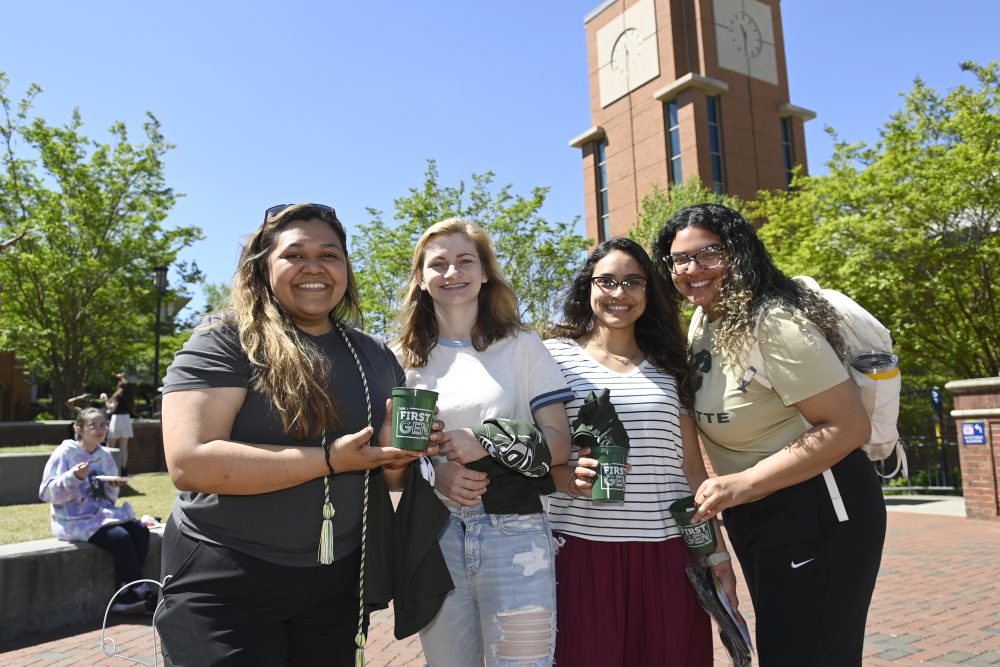
Excited about nanoscale science, Avila googled the topic, finding UNC Charlotte’s NanoSURE program. She read about chemistry professor Kirill Afonin’s work with nucleic acids and nanoparticles. UNC Charlotte’s summer research program deadline had just closed, but Avila emailed Professor Tom Schmedeke, then chair of the program, and explained her desire to contribute to the science. He invited her to apply, and she was accepted and spent summer 2018 at UNC Charlotte before returning to Sul Ross State to complete her undergraduate studies.
At the conclusion of the summer program, Juan Vivero-Escoto, Charlotte professor of chemistry, encouraged Avila to consider graduate school.
Moving away from her family for more than just a summer would be difficult, but she said, “I realized incredible work was taking place at Charlotte, and I wanted to be a part of it. I flew back home to Texas, and I had to ask myself ‘Did that really happen? Was I really a scientist?’ It felt like a dream — the best kind of dream — it was so fun.”
Pursuing a Ph.D.
Avila marveled not only at the notion of being the first in her family to attend college, but of becoming a doctor.
When she learned she had been accepted to Charlotte’s Ph.D. program, Avila knew she would have to sit down with her family to explain why she was making the move. Avila’s family understood her unbridled excitement and offered their loving support.
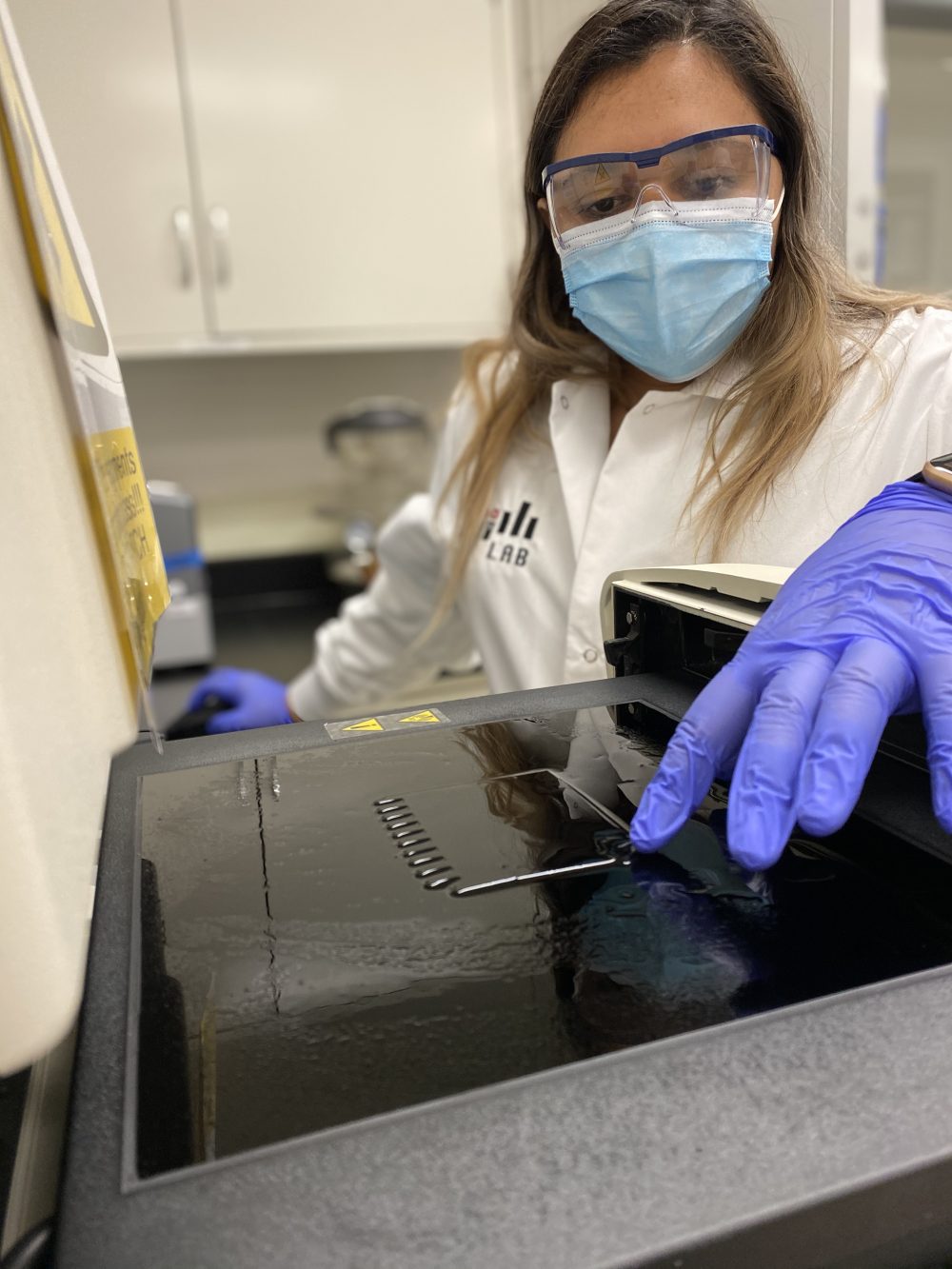
Expecting to begin doctoral studies in fall 2019, Avila thought she would have months to relocate. Charlotte’s Afonin had other ideas; he invited her to join his lab for the summer, spending time learning from other Ph.D. candidates.
She accepted the offer and absorbed all she could to acclimate herself to this new world. In fall, she started her Ph.D. coursework and taught General Chemistry I and II classes, which Avila credits with strengthening her communication skills.
“In Dr. Afonin’s lab, I worked with DNA and RNA to make nucleic acid nanoparticles, or NANPs. My main research goal was how do we get these NANPs into cells and observe what happens,” said Avila.
Her research became her dissertation proposal, and she was awarded a National Institute of Health predoctoral fellowship in spring 2022. It came at an opportune time, as Avila had another two years of the Ph.D. program and was juggling becoming a first-time mother.
“Getting a Ph.D. is hard, as is being away from family and having a baby during Covid. The only thing that kept me here was this funding. I know external validations shouldn’t count for everything, but a panel of scientists decided to fund me over the next two years,” said Avila.
Avila thrived in Afonin’s lab and is grateful for the opportunity to teach and mentor the next generation of scientists.
Obtaining a postdoctoral fellowship
In March 2024, Avila was selected as an iCURE scholar for a postdoctoral fellowship with the National Cancer Institute. iCURE is an extension of the NCI Center to Reduce Cancer Health Disparities highly competitive and successful extramural Continuing Umbrella of Research Experiences training program. CURE supports the career progression of scholars working toward research independence and fosters the biomedical research pipeline.
It also offers three-year awards for postdoctoral fellows and provides opportunities to work closely with world-class researchers at the National Cancer Institute. Awardees receive support from NCI program staff, access to resources on intramural and extramural funding opportunities, opportunities for professional and career development activities, and connections to an extensive mentoring network. Avila also will receive a stipend as a first-year iCURE postdoc scholar.
Afonin said, “This is a fantastic achievement for Yelixza and a testament to her dedication and capabilities.”
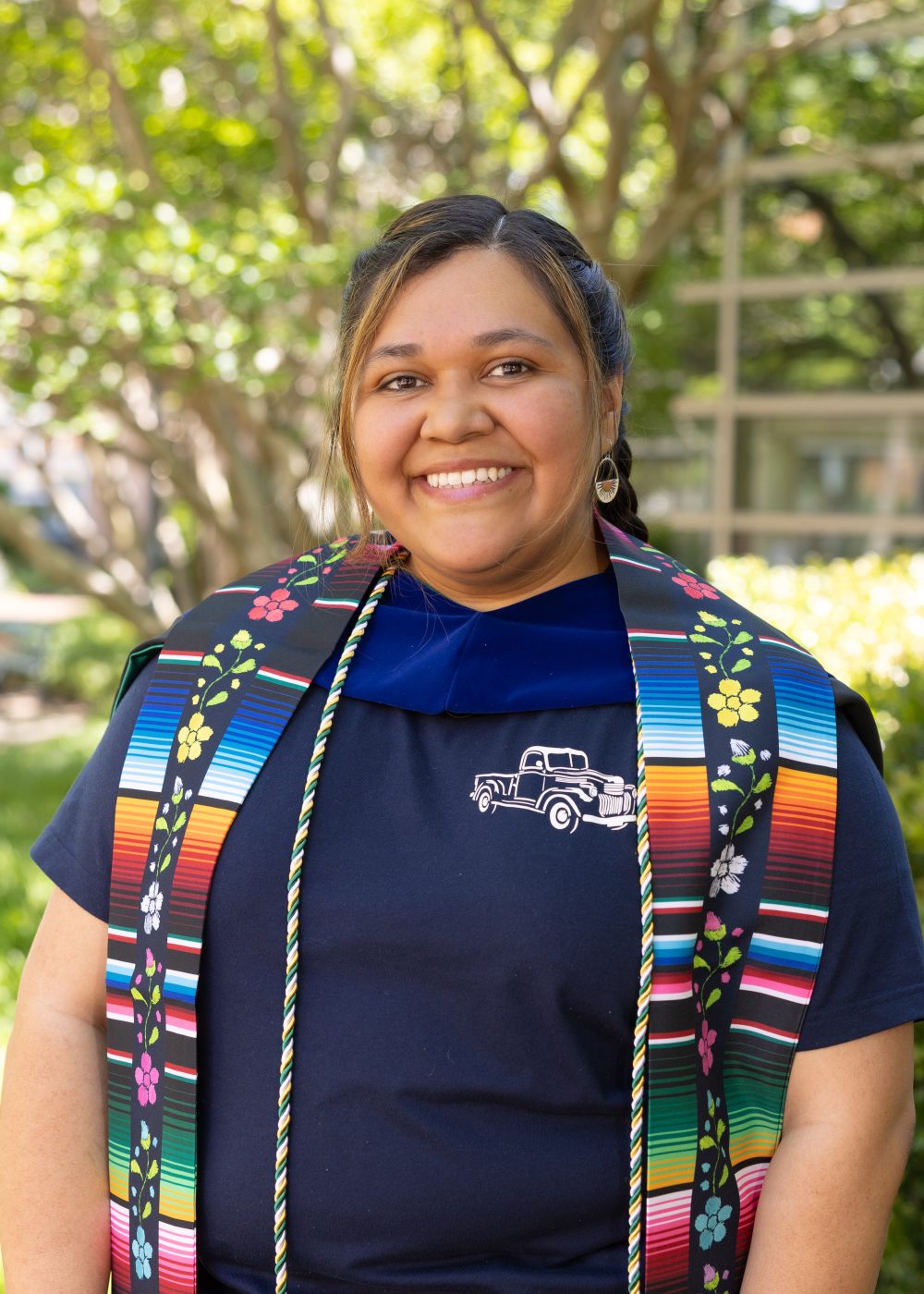
Graduation and the future
Avila’s grandfather died before she defended her Ph.D. dissertation. Her close-knit family was rocked by this event, and Avila went home to grieve and support her family. Avila’s mother made T-shirts in his honor with an image of his truck on the front.
“It’s a ’41 Chevy that he loved to drive us around town. I wanted to bring him along for the ride and honor him in one of the only ways I knew how. So, even though he won’t be in the graduation photos with me and the rest of my family, he’ll still be a part of the memories from this time,” said Avila.
On Saturday May 11, Avila will be hooded in recognition of completing a Ph.D. in nanoscale science; her family will be in attendance.
She is interviewing with research labs that she will join for her postdoc fellowship, but she will carry her family in her heart as she moves to Bethesda, Maryland, with her partner, their son, and three dogs.
“I want to make everything worth it. Every moment away is for them, for my family now,” said Avila. “I’ve been so fortunate, I look into the past, and I was surrounded by amazing mentors who believed in me, until I started to believe in myself.”
Danillo Augusto publishes in Nature Medicine on possible predictive autoantibody for multiple sclerosis
Danillo Augusto, Ph.D., an assistant professor in biology at UNC Charlotte, is co-author of a study published last week in Nature Medicine.
The research points to a significant breakthrough in the understanding and early detection of multiple sclerosis (MS). Researchers have identified a unique autoantibody signature present in approximately 10% of patients with MS years before the onset of clinical symptoms.
The study stated, “These patients exhibit antibody reactivity years before developing MS symptoms and have higher levels of serum neurofilament light (sNfL) compared to profiles of hundreds of patients with MS. This profile is preserved over time, providing molecular evidence for an immunologically active preclinical period years before clinical onset. This autoantibody reactivity was validated in samples from a separate incident MS cohort in both cerebrospinal fluid and serum, where it is highly specific for patients eventually diagnosed with MS.”
Augusto said, “This study sheds light on the preclinical phase of MS and provides a promising avenue for early detection and intervention. Identifying patients at high risk of developing MS before symptom onset could revolutionize patient care and treatment strategies.”
Read more about Danillo Auguto’s study on Inside UNC Charlotte.
16 College of Science Faculty join the ‘Million Dollar Research Circle’
Chancellor Sharon L. Gaber recognized researchers across the University with more than $1 million or more in active external funding at a reception on March 27.
The Million Dollar Research Circle, one of several new initiatives to support research through the Division of Research, honors faculty who have received federal and state grants, as well as grants and awards from business and industry to support research, programs and creative discoveries.
College of Science faculty represented 16 of the total 65 principal investigators honored.
Congratulations to the College of Science faculty in the Million Dollar Research Circle:
Ishwar D. Aggarwal
Kirill A. Afonin
Danillo G. Augusto
Christopher M. Bejger
Anthony M. Fernandes
Jonathan J. Foley
Kristen E. Funk
Ian Marriott
Allison W. McCulloch
Adam M. Reitzel
Bao-Hua Song
Thomas J. Suleski
Andrew Truman
Patricija van Oosten-Hawle
Juan L. Vivero-Escoto
Shan Yan